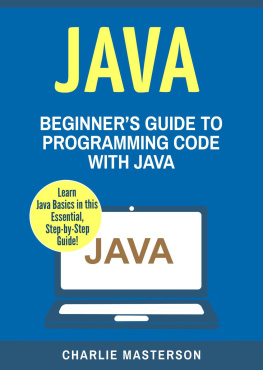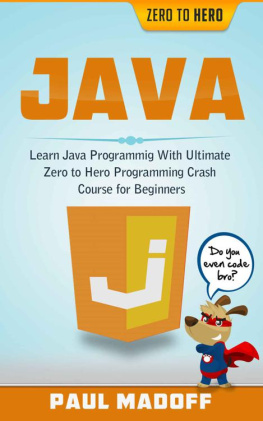Mark Lassoff [Mark Lassoff] - Java Programming for Beginners
Here you can read online Mark Lassoff [Mark Lassoff] - Java Programming for Beginners full text of the book (entire story) in english for free. Download pdf and epub, get meaning, cover and reviews about this ebook. year: 2017, publisher: Packt Publishing, genre: Home and family. Description of the work, (preface) as well as reviews are available. Best literature library LitArk.com created for fans of good reading and offers a wide selection of genres:
Romance novel
Science fiction
Adventure
Detective
Science
History
Home and family
Prose
Art
Politics
Computer
Non-fiction
Religion
Business
Children
Humor
Choose a favorite category and find really read worthwhile books. Enjoy immersion in the world of imagination, feel the emotions of the characters or learn something new for yourself, make an fascinating discovery.
- Book:Java Programming for Beginners
- Author:
- Publisher:Packt Publishing
- Genre:
- Year:2017
- Rating:3 / 5
- Favourites:Add to favourites
- Your mark:
Java Programming for Beginners: summary, description and annotation
We offer to read an annotation, description, summary or preface (depends on what the author of the book "Java Programming for Beginners" wrote himself). If you haven't found the necessary information about the book — write in the comments, we will try to find it.
Java Programming for Beginners is an introduction to Java programming, taking you through the Java syntax and the fundamentals of object-oriented programming.
About This Book
- Learn the basics of Java programming in a step-by-step manner
- Simple, yet thorough steps that beginners can follow
- Teaches you transferable skills, such as flow control and object-oriented programming
Who This Book Is For
This book is for anyone wanting to start learning the Java language, whether youre a student, casual learner, or existing programmer looking to add a new language to your skillset. No previous experience of Java or programming in general is required.
What You Will Learn
- Learn the core Java language for both Java 8 and Java 9
- Set up your Java programming environment in the most efficient way
- Get to know the basic syntax of Java
- Understand object-oriented programming and the benefits that it can bring
- Familiarize yourself with the workings of some of Javas core classes
- Design and develop a basic GUI
- Use industry-standard XML for passing data between applications
In Detail
Java is an object-oriented programming language, and is one of the most widely accepted languages because of its design and programming features, particularly in its promise that you can write a program once and run it anywhere.
Java Programming for Beginners is an excellent introduction to the world of Java programming, taking you through the basics of Java syntax and the complexities of object-oriented programming. Youll gain a full understanding of Java SE programming and will be able to write Java programs with graphical user interfaces that run on PC, Mac, or Linux machines. This book is full of informative and entertaining content, challenging exercises, and dozens of code examples you can run and learn from.
By reading this book, youll move from understanding the data types in Java, through loops and conditionals, and on to functions, classes, and file handling. The book finishes with a look at GUI development and training on how to work with XML. The book takes an efficient route through the Java landscape, covering all of the core topics that a Java developer needs. Whether youre an absolute beginner to programming, or a seasoned programmer approaching an object-oriented language for the first time, Java Programming for Beginners delivers the focused training you need to become a Java developer.
Style and approach
This book takes a very hands-on approach, carefully building on lessons learned with snippets and tutorials to build real projects.
Downloading the example code for this book. You can download the example code files for all Packt books you have purchased from your account at http://www.PacktPub.com. If you purchased this book elsewhere, you can visit http://www.PacktPub.com/support and register to have the code file.
Mark Lassoff [Mark Lassoff]: author's other books
Who wrote Java Programming for Beginners? Find out the surname, the name of the author of the book and a list of all author's works by series.

![Mark Lassoff [Mark Lassoff] Java Programming for Beginners](/uploads/posts/book/119362/thumbs/mark-lassoff-mark-lassoff-java-programming-for.jpg)



![Yakov Fain [Yakov Fain] - Java Programming 24-Hour Trainer, 2nd Edition](/uploads/posts/book/119348/thumbs/yakov-fain-yakov-fain-java-programming-24-hour.jpg)






